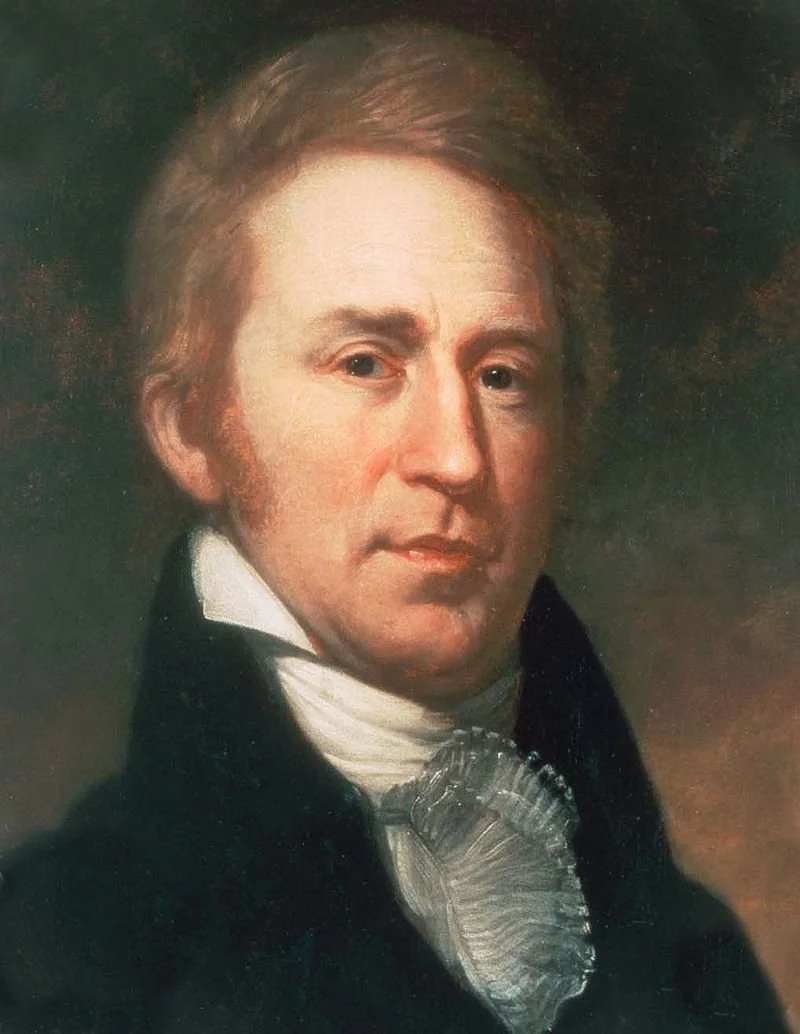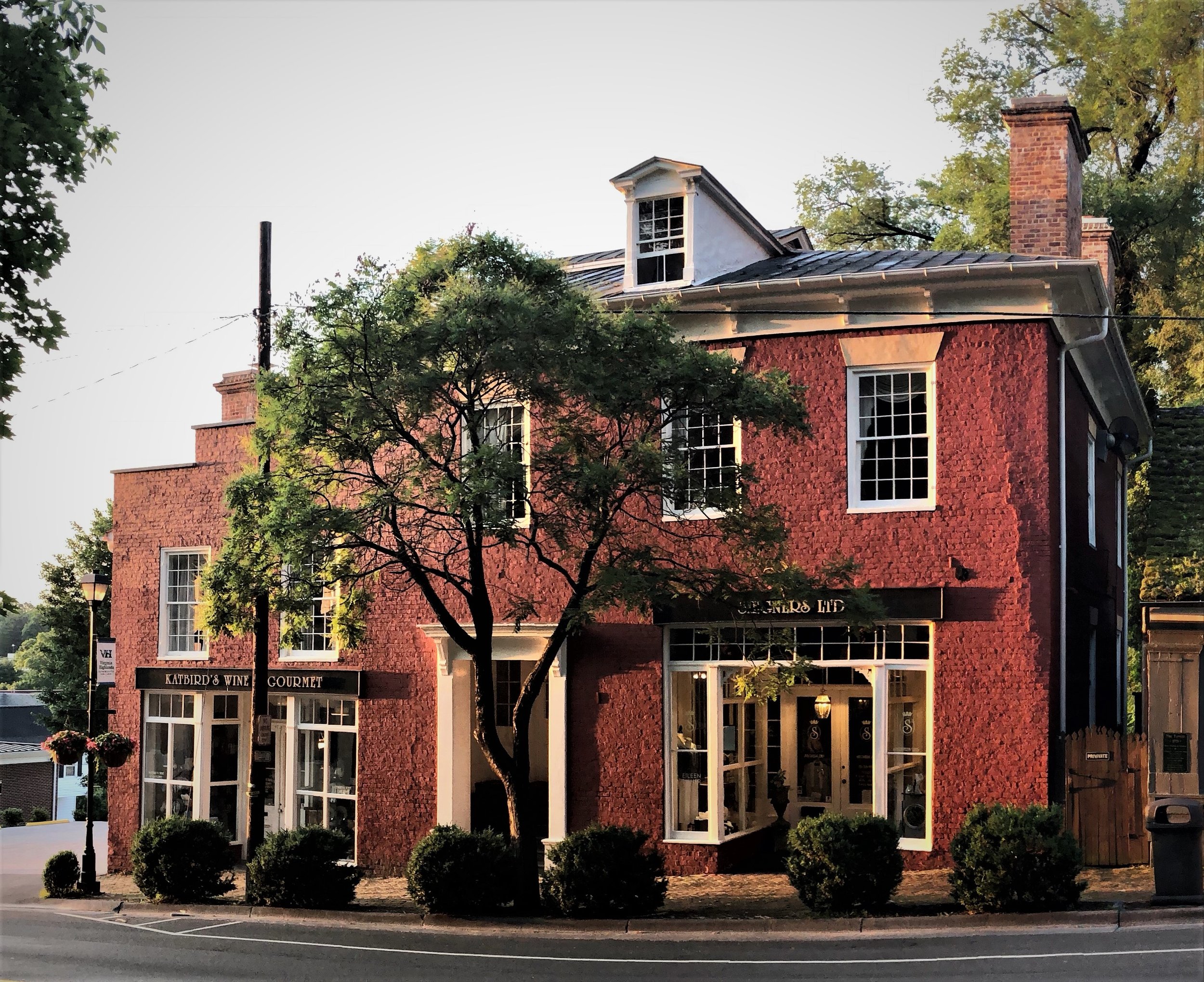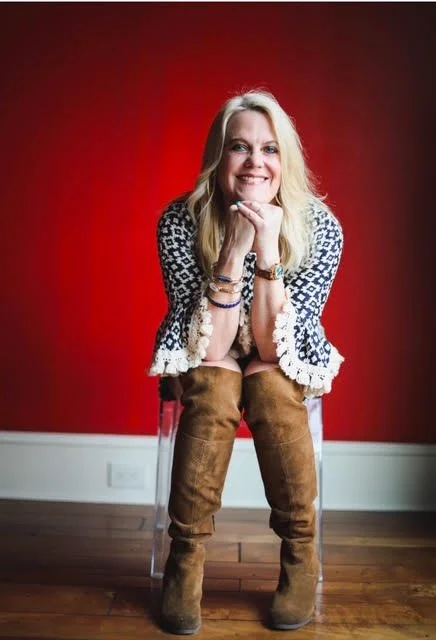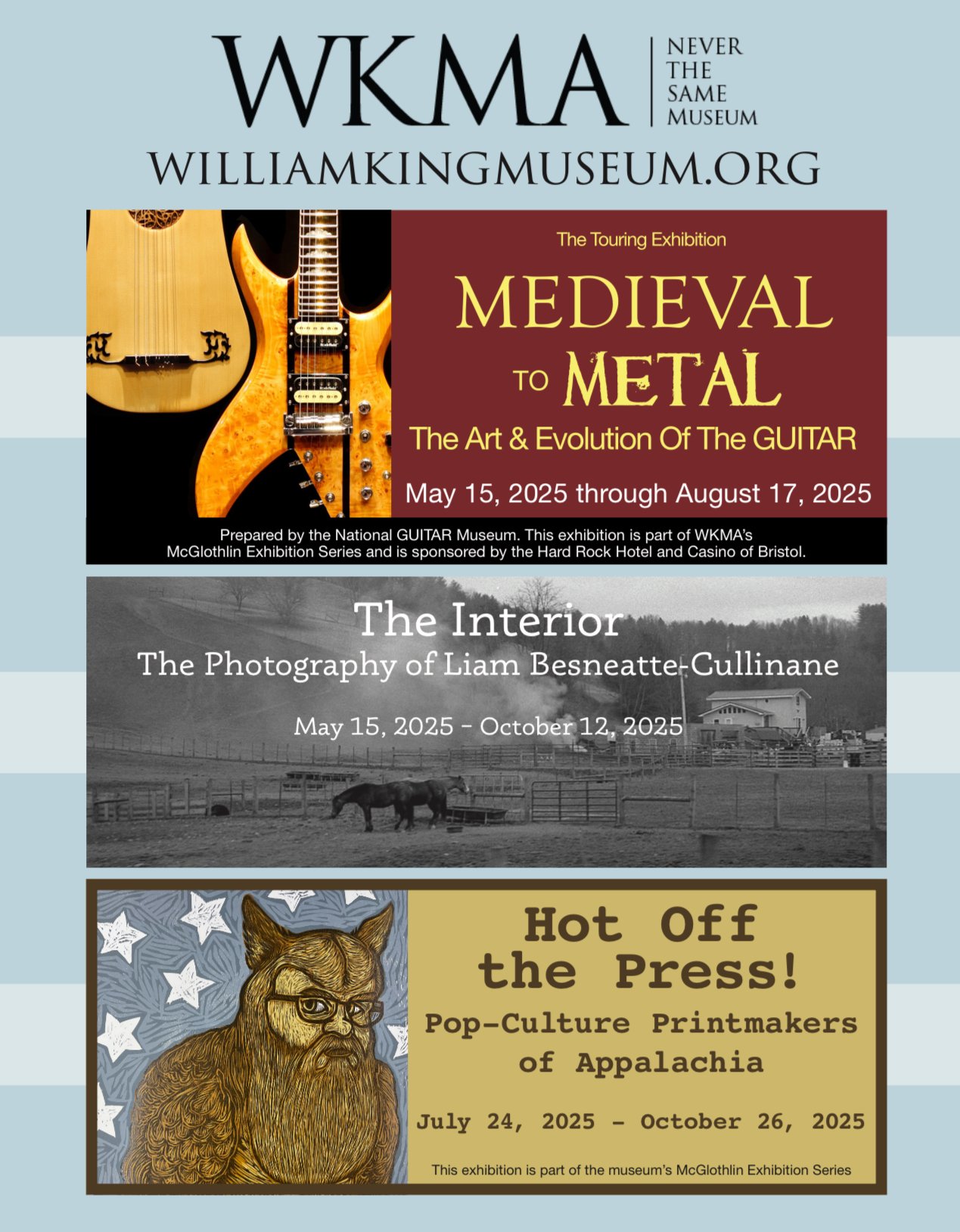
For over 200 years, Abingdon has been the cultural, political, and sometimes the economic center of the entire region, and that rich history draws people to Abingdon.
Explore History with Us!
2025 Local History Events
VA250 Mobile Museum
Friday, July 25 to Tuesday, July 29: 10am-6pm
Free
Southwest Virginia Higher education Center
VA250 is a state-wide series of events which will educate Virginians about their state’s role in the American Revolution. There will be lectures, reenactments, and the VA250 Mobile Museum Experience which will bring the stories of Virginia’s rich history to schools, museums, and festivals—all over the Commonwealth.
The VA250 Mobile Museum Experience--entitled “Out of Many, One”--is a quad-expandable tractor trailer with lots of hands on, interactive, and immersive exhibits in this “museum on wheels.” It tells Virginia’s seminal role in the American Revolution, from Patrick Henry’s 1775 “Give me liberty or give me death!” speech, to General George Washington’s victory at the Siege of Yorktown, to the roles of Indigenous Virginians, free and enslaved Africans, and men and women from all over Virginia who played critical roles in the winning of American independence.
Washington County’s significant connections to the American Revolution are often overlooked. The county was created in December 1776, just five months after the Declaration of Independence. Many of the men who fought in Lord Dunmore’s War before independence, signed the Fincastle Resolutions in 1775 and fought at King’s Mountain in 1980, were from the area. Thomas Jefferson wrote that the Battle at King’s Mountain “turned tide of the American Revolution, making victory a year later at Yorktown possible.”
As a part of VA250’s local activities, Michael Henningsen will perform a first-person dramatization of the life of Parson Charles Cummings, a local religious and military leader, and one of the founders of Abingdon. Also, Walter Jenny will lecture on the Fincastle Resolutions, one of the central political actions made by colonial Americans in the lead up to the American Revolution—and most of the signers were from what is today Washington County.
Barter Theatre: History and Backstage Tour
Friday, July 25: 11am and 4pm
Friday, August 1: 11am and 4pm
$10 (payable at the event), 127 W. Main Street
Learn about the history of Barter Theatre, from its beginnings during the Depression of the 1930s to its becoming the State Theatre of Virginia and one of the most respected repertory theatres in the United States. Visit the backstage area, dressing rooms, and maybe even get to see the mysterious “Barter tunnel.”
This tour will be at least 1.5 hours long and includes several flights of stairs, as well as lengthy periods of standing. Tours are limited to no more than 25 people, on a first-come, first-served basis.
Tour of White’s Mill
Friday, July 25 - Sunday, July 27: 10am-5pm
Thursday, July 31 – Sunday, August 3: 10am -5pm
Free
12291 White’s Mill Road
Tour one of the last working grist mills in the region. White’s Mill has recently undergone a complete renovation to the outside of the building, including a new roof, siding, windows, and major structural work to the hurst frame and south wall. Visit the Mercantile, and shop for goods by local artisans as well as White’s Mill cornmeal and grits.
Living History Tour of the Historic Sinking Spring Cemetery
Saturday, July 26
5:00-7:15pm
$5 cash only.
Russell Rd. at Valley St.
One of Abingdon’s cherished historical sites is the Sinking Spring Cemetery. At the west end of Valley Street, the cemeteryis located on part of a 55-acre tract of rural land acquired by local Presbyterians from Dr. Thomas Walker in 1774. The log church they built on the site was the home of the first established congregation on the frontier west of the Blue Ridge Mountains. Beginning with Henry Creswell who was killed by Native Americans in 1776, about three thousand burials now fill the old churchyard, including two governors, at least nine Revolutionary War veterans and over 800 in the African American section.
Each year during the Festival, members of the Historical Society of Washington County stage guided “Living History” tours at Sinking Spring. Interpreters, many wearing period attire, tell the fascinating stories of some of the cemetery’s permanent residents. The staggered small-group tours take less than an hour on a gravel route; comfortable walking shoes are recommended. This fundraiser for the historical society costs $5 per person and begins at 5 p.m.
William King House Historic Marker
Saturday, July 26
10am 108 Court St.
A new historical marker will be dedicated on Court Street in Abingdon on Saturday, July 26, and the public is invited to attend.
The marker recognizes William Clark’s visit in 1809 to the home of William King on his way from St. Louis to Washington D.C. After the Corps of Discovery expedition, Clark had been appointed by President Thomas Jefferson as brigadier general of the militia for the Louisiana Territory and a federal Indian agent dealing with western tribes. The Great Wagon Road through Washington County on which Clark was traveling was a main route of cross-country travel between the East Coast and the western frontier.
King, who immigrated from Ireland with his family in 1784 and settled in the Saltville area by 1792, quickly made a fortune by developing the salt works and shipping salt down the Holston and Tennessee rivers to the Mississippi. It was during those years it is believed King met Clark, who was also shipping goods on the Mississippi River. After building Grace Hill in Abingdon in 1803, King died in 1808 at the age of 38 or 39 and is buried at Abingdon’s Sinking Spring Cemeteryistoric Ma.
As an example of his wealth, King had acquired 90 tracts and town lots covering 19,473 acres in Washington County, 3,494 acres in Wythe County and 10,880 acres in Tennessee. His will and estate were so convoluted that his estate was not settled by the United States Supreme Court until 1843, thirty five years after his death in Abingdon.
Grace Hill has been recently restored by David and Jill Dalton and will be part of the historic homes tour this year.
Participating in the dedication will be Thomas Jefferson as interpreted by Kurt Smith of Colonial Williamsburg. The public will be able to visit with Mr. Jefferson after the dedication at the log cabin on Plumb Alley behind the courthouse, and will be appearing in other events during the festival.
The marker will be the newest of some 3,000 markers installed by the Virginia Department of Historic Resources, and the twenty first marker to be installed in Washington County. It is the latest marker sponsored by the Virginia Lewis & Clark Legacy Trail. You can visit their website at valewisandclarklegacytrail.org for more information.
William Clark, by Charles Willson Peale
“The Highway Marker Program identifies and documents Virginia’s significant historical persons, events, and places. Our focus is on educating the public and providing accurate historical information, rather than on honoring, memorializing, or commemorating individuals or events. These markers, placed along state highways and roads, serve as a valuable resource for residents and visitors alike, providing a deeper understanding of the state’s rich history and cultural heritage.“
- Department of Historic Resources website
Duncansville One-Room Schoolhouse Tour
Saturday, July 26, 10am-4pm
Sunday, July 27, 2pm-4pm
Saturday, August 2, 10am-4pm
Sunday, August 3, 2pm-4pm
225 Stanley St. between the Coomes Center and E. B. Stanley Middle School
Free
Tour the fully restored late 19th-century schoolhouse, hosted by the Washington County Retired Teachers, who give visitors a glimpse of what early education was like, including wooden desks, inkwells, slates, and a pot-bellied stove.
How to Clean Tombstones, with Charlie Barnette
Saturday, July 26, 1:30pm
Free
Sinking Spring Cemetery, Valley St. at Russell Rd.
Have you ever visited a cemetery only to find your ancestors’ headstones covered with dirt and lichens making the text almost illegible? Lichens can also damage the gravestone itself, and with time can irreparably fragment the gravestone’s surface. Unfortunately, you showed up unprepared to do anything about it.
Charlie Barnette of the Historical Society of Washington County brings his skills as a cemetery preservationist to Abingdon’s historic Sinking Spring Cemetery, dating to 1776, for a free workshop. He’s been cleaning, resetting and documenting headstones in and around Washington County for the past two decades. Charlie will share his tips and answer your questions about the best methods and equipment to use so you can bring old headstones back to life without causing more damage.
Comfortable walking shoes and a hat are recommended.
A Conversation with Thomas Jefferson and Martha Washington
Sunday, July 27 and Monday, July 28
Martha Washington Inn & Spa ballroom
6:30pm with a cash bar opening at 5:30pm
$25 per person, with a child 12 or under free when accompanied by a ticketed adult.
Many visitors don't realize that Abingdon's roots predate the Declaration of Independence so they may be surprised to find Thomas Jefferson and Martha Washington greeting people at this year's Festival.
For the past five years the Historical Society of Washington County has brought Bill Barker, an internationally recognized historical interpreter of Thomas Jefferson now based at Monticello, to Abingdon. This year, Kurt Smith, who interprets Jefferson at Colonial Williamsburg, will take the stage along with Martha Washington, portrayed by Katharine Pittman also of Colonial Williamsburg.
Our area's connections with Jefferson and Washington are numerous. Jefferson, of course, served as Secretary of State in Washington's administration and helped forge the structure of our nation's government and economy. Thomas Jefferson's father Peter played a pivotal role in surveying the western lands where we now live and piqued his son's lifelong interest in the western frontier. Washington County was created in 1776 - one of the first counties created by the newly independent Commonwealth of Virginia - and named in honor of Mrs. Washington's husband, Gen. George Washington. For almost two centuries the building in which they will be performing has been associated with the name of America's first First Lady.
Katharine Pittman and Kurt Smith will meet local guests on Sunday July 28 and Monday July 28 in the ballroom of the historic Martha Washington Inn and Spa on Abingdon's Main Street. both performances will begin at 6:30pm with a cash bar opening at 5:30pm. Tickets are $25 per person, with a child 12 or under admitted free when accompanied by a ticketed adult. The programs raise funds for the Historical Society.
Smith and Pittman will also speak at a free program at the Higher Ed Center on Monday afternoon to share insights with anyone, young or old, who is interested in developing their own skills of historical interpretation.
We are honored to have these two Nation Builders in Abingdon as we prepare for America's 250th birthday next year. It's a rare opportunity you and your family won't want to miss.
THANK YOU to the generous sponsors for this fantastic event!
Ben & Merry Jennings
Carl & Mary Coalson
Brett & Jessica Compton
Walter & Rose Ann Jenny
Creeper's End Lodging
First Bank & Trust
Appalachian Memory Keepers
New Peoples Bank
Abingdon Olive Oil Company
Eye Physicians of Southwest Virginia, PC
Historical Interpretation Workshop
July 28 at 1:30pm
Anyone who has visited Colonial Williamsburg has seen what appear to be time travelers – dozens of people who evoke the 18th Century in attire, speech and manners.
What’s it like to interpret a figure from history? Have you ever wanted to share stories about your ancestors in the first person?
Bill Barker and Kurt Smith have over 40 years of experience portraying Thomas Jefferson. Barker is considered by many to be one of the earliest historical interpreters, first in Philadelphia, then at Colonial Williamsburg and today at Jefferson’s Monticello. Smith now portrays the younger Jefferson as he would have appeared in Virginia’s colonial era.
They will appear together in a rare opportunity to share tips and answer questions from the public. The free workshop, sponsored by the Historical Society of Washington County, will take place at the Higher Education Center
St. Thomas Episcopal Church Luncheons
Monday, July 28: 11am-1pm
Wednesday, July 30: 11am-1pm
St. Thomas Episcopal Church, 124 E. Main St.
Adults, $14, Children (under 10) $10
Having lunch at St. Thomas Episcopal Church is a 30-year tradition at the Virginia Highlands Festival. Everyone is welcome. The menu includes quiche, salad, dessert, and a beverage. Ham biscuits can be purchased for an additional $5.00. All proceeds are donated to ministries in the Abingdon area, the Appalachian region, and the global community.
Illustrated Lecture and Workshop: How to Take Care of Antique Textiles
Monday, July 28: 2pm
Executive Auditorium
Southwest Virginia Higher Education Center
Most people have antiques textiles, handed down for several generations: clothing, quilts, coverlets, cutwork, crocheted pieces, etc. How should they be cared for? Should they be kept in cedar chests, kept in plastic bags, washed occasionally? This lecture and workshop, in conjunction with the William King Museum of Art, will answer these questions.
The expert leading the workshop is Colleen Callahan, a textile historian and curator with experience in conservation. For many years she was the curator of textiles at the Valentine Richmond History Center, managing the 30,000-piece costume and textile collection. Since 2003, she has had her own consulting business, where she has helped with conserving and exhibiting many presidential family garments, including those of Martha Washington at Mt. Vernon and Thomas Jefferson at Monticello. She has been the WKMA textile consultant since 1994 through its Cultural Heritage Project.
If you have a textile that you have questions about, bring it, and there will be documentationsavailable as time permits.
Illustrated Lecture: The Pottery Industry in 19th CenturyWashington County Virginia
Joshua Huffman, Curator of Southwest Virginia & Northeast Tennessee Decorative Arts and Material Culture, William King Museum of Art
Tuesday, July 29: 2pm
Executive Auditorium, Southwest Virginia Higher Education Center
In the 19th century, the production of earthenware and stoneware pottery along the branches of the Holston River, was one of the important early industries in Washington County, Virginia. Areas of high pottery concentration were along rivers, with proximity to clay, transportation, and markets. The earliest earthenware pottery soon gave way to more durable stoneware that began to dominate the market. Learn about the potters (Barlow, Magee, Davis, Vestal, Keys) as well as the potteries in the Osceola community on the Middle Fork and Alum Wells on the North Fork. This illustrated lecture is a preview of a major exhibition “Potters along the Holson” beginning in September at the William King Museum of Art.
Illustrated Lecture: Are you thinking of buying an Old House?
Daniel Shew
Wednesday, July 30: 2pm
Executive Auditorium, southwest Virginia Higher Education Center
So you are thinking of buying an Old House? Come to this illustrated lecture by Daniel Shew, the Old House Agent in the Tri-Cities area. Shew and his wife Monica believe in the personal and community rewards for preserving old homes and restoring them. They have bought and restored three properties in the Solar Hill Historic District of Bristol, Virgina, especially the King-Mitchell House, built in 1816, where they currently live. It was the main house for the plantation that existed in the valley, long before Bristol’s inception. Learn about all of the challenges—as well as the considerable rewards—to restoring old houses.
Abingdon Downtown Walking Tour
Wednesday, July 30, 7:30pm
Saturday, August 2, 10am
Sunday, August 3, 7:30pm
Free
Meet at the front steps of the Washington County Courthouse
How are the salt industry, Shangri-La, Daniel Boone, Eleanor Roosevelt, and the American Southwest all connected to Abingdon? Join local historians and Abingdon natives Garrett Jackson (on Wednesday or Sunday) or Donnamarie Emmert (on Saturday) on this walking tour of Abingdon’s known and little-known history. Learn how a small frontier town in the 1770s became a center for the arts, culture, politics, and religion in Southwest Virginia.
Historical Interpretations: Meet Abingdon Pioneer, Parson Charles Cummings
Wednesday, July 30: 7:30pm
Executive Auditorium, Southwest Virginia Higher Education Center
Cummings Street, one of Abingdon’s central streets. The Cummings Cabin in Sinking Spring Cemetery. Who was Charles Cummings who figures so prominently in Abingdon history? Michael Henningsen, the historic interpreter at the Abingdon Muster Grounds, will portray Charles Cummings in a one-person performance, giving the audience a sense of Charles Cummings’s life and the years of Abingdon.
Cummings was born in northern Ireland, a descendant of Scottish royalty, whose family immigrated to Pennsylvania and then to the Shenandoah Valley in the mid-1700s. He became a Presbyterian minister and accepted a calling to come to the frontier of western Virginia in the 1770s, establishing the Sinking Spring Presbyterian Church. He was an Indian fighter and frequently carried a gun with him when he was preaching.Cummings was a signer, and perhaps the author, of the Fincastle Resolutions, which emphasized that the consent of the governed and legitimate resistance to authority were extensions of his Presbyterian covenant theology.
Lecture: The Importance of the Fincastle Resolutions to the American Revolution by Walter Jenny
Thursday, July 31: 7:30pm
Executive Auditorium, Southwest Virginia Higher Education Center
People know that many of the militiamen who fought at the Battle of Kings Mountain were from Washington County, Virginia—the Abingdon Muster Grounds commemorates that event. However, few people know that Washington County men made up the majority of signers of the Fincastle Resolutions, one of the landmark political actions leading up to the American Revolution. The resolutions were the first statement by colonists which promised resistance to the death to the British Crown to preserve political liberties.
Walter Jenny, the president of the Historical Society of Washington County Virginia, will tell the story behind the resolutions. If you are interested in area history, and especially if you are a descendant of one of these fifteen signatories of the Fincastle Resolutions, you need to learn about the bravery of your ancestor and his contribution to American history.
The area signers of the Fincastle Resolutions were Arthur Campbell, David Campbell, William Campbell, Walter Crockett, Charles Cummings, William Edmondson, William Ingles, Thomas Madison, James McGavock, John Montgomery, William Preston, Evan Shelby, Daniel Smith, and Stephen Trigg.
Illustrated Lecture: Decorating with Family Heirlooms & Estate Sale Finds
Thursday, July 31, 2:00 pm
Martha McGlothlin Bowman of Life on Virginia
Executive Auditorium, Southwest Virginia Higher Education Center
You inherited some furniture from your grandparents: a bed, sideboard or dining table. Or perhaps you love going to estate sales but have no idea how to incorporate those pieces into your decor. Decorating with family heirlooms and estate sale finds adds a layer of history, character, and personal storytelling to a home. These unique pieces–whether it’s a vintage mirror, an antique chest, or hand-me-down china–bring a sense of timeless charm and individuality that mass-produced items often lack. Mixing heirlooms with curated estate sale treasures allows for an eclectic yet cohesive aesthetic, where each item has a story and sentimental value. This is particularly true in table settings. Thoughtfully displayed, these objects not only enhance a room’s style but also create meaningful connections to the past, turning a house into a deeply personal and inviting home.
Martha McGlothlin Bowman, who has a popular decor Instagram called Life on Virginia, will illustrate how collecting and decorating with meaningful things you love will come together to make a gorgeous, lived-in home that’s uniquely yours.
Abingdon Historic Homes Tour
Saturday, August 2: 10am-4pm, Downtown Abingdon
$25, Cash or Credit Card
Abingdon prides itself on its well-preserved downtown historic district and its commitment to historic preservation. Tour the interiors of a variety of the best-preserved Federal, Victorian, and early 20th-century houses and buildings in Virginia, all within walking distance downtown. Guided tours of the Martha Washington Inn and Spa will be every half hour.
Ticket Purchasing Options: $25 each. Purchase tickets online at the link below, or during the month of July at Shady Business (180 East Main St.). On the day of the tour, tickets will be for sale on the porch of 262 Bradley St. or at Shady Business.
*Even if you have purchased a ticket online, you must pick up the printed house guide and map to the houses at Shady Business or at 262 Bradley St. on the day of the tour.
Abingdon Spirit Tours
Every night of the Festival, except Sunday, August 3, 7:30pm
$20 (Cash only)
Meet at Wolf Hills Coffee, 112 Court St
Join Abingdon’s “Haint Mistress” Donnamarie Emmert as she guides participants on her Abingdon Spirit Tour, now in its 29th year. Walk along historic Main Street delighting in the town’s history and the ghost stories of businesses and homes along the way. Not recommended for children under 10, or people in wheeled conveyances. Tours will be called off in case of heavy rain.
Abingdon Muster Grounds Activities
The Abingdon Muster Grounds celebrates where the militiamen from western Virginia gathered during the American Revolution and then traveled over the mountains to fight at the Battle of Kings Mountain, a turning-point event of the war. There is an interpretive center at the Grounds, which is also the northern terminus of the Overmountain Victory National Historic Trail.
There are several events every day of the Festival at the Muster Grounds reflecting life in the late 18th-century in the Backcountry of Virginia , including music, crafts demonstrations, storytelling events, reenactments, and even conventicles which represented the style of preaching of that era.
William King Museum of Art: Exhibits
Daily, 10am-5pm. Sundays, 1-5pm Free
415 Academy Drive
Enjoy three extraordinary exhibitions:
Medieval to Metal: The Art and Evoloution of the Guitar, Hot Off the Press! Pop-Culture Printmakers of Appalachia, and The Interior: the Photography of Liam-Besneatte-Cullinane







































